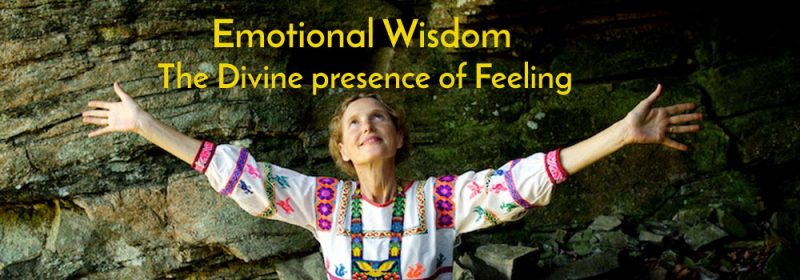In my last post we explored how anger, so vilified in our culture as a ‘negative’ emotion, actually plays a vital role in helping to protect us. Healthy anger rises up when we experience some kind of hurt, abuse or manipulation. It impels us either to set a new boundary or to restore and reinforce an existing boundary, agreement or commitment that has been violated. To set a boundary is to outline what is, and is not, okay for our wellbeing. It often manifests as the ability to say “no” or “stop” when someone is hurting or manipulating us either physically, emotionally, psychologically or spiritually. Sometimes boundary setting involves removing ourselves from the situation. The balanced expression of anger gives us just enough impetus, energy and courage to say ‘no’ or state what we need with a strength that is proportional to the situation.
But don’t boundaries just separate us?
Many of us value teachings that point to our Oneness and ask us to see ourselves, not as separate individuals, but to experience the common heart, to abide in unity. So don’t boundaries just reinforce a sense of ego-identity?
A helpful way to relate to healthy boundaries is as a form of good stewardship. This organism of ours — including our body, mind, emotions and spirit —comes to us as a gift from nature, from the Divine, however you relate to that. It’s the vehicle we’ve been given to experience the sacred, within ourselves and within the living world around us. It is a temple that has been entrusted to us so that we can live this life of learning and offering. Good boundaries go beyond “me” and “mine”. Maintaining healthy boundaries is simply good stewardship of the sacred gift we’ve been given.
While it is wonderful to have the natural impulse to appreciate another’s pain and to reach out to support, we tend to base our identity and value on our ability to do that.
It can sometimes be challenging for those on a spiritual path to practice good boundary setting. We may be reluctant to set boundaries as we attempt to follow a spiritual teaching or belief about unity, or compassion, or to practice obedience to a teacher. It can be very difficult to discern between the necessity of the ego to surrender in order to experience the Divine, whilst not allowing ourselves to be taken advantage of in the name of spirituality. This asks us to explore the source of the anger to see if there is some real abuse going on or if it is the ego-mind that is objecting to being challenged.
When is a boundary not healthy?
Sometimes, in the name of setting a boundary, we can find ourselves simply bolstering the fears and desires of the ego-mind. We may put boundaries in place that are more about protecting our own agenda and standards rather than actually providing protection from hurt or disrespect. We may become inappropriately insistent or assertive about a boundary. E.g. “I don’t want you to go to the game/yoga because I want you to stay home and do chores”. “I’m angry with you because you didn’t fulfill this task the way it should be done!” (Even though there was no discussion or agreement about the standards or conditions of satisfaction). At times we put boundaries in place to protect ourselves from constructive feedback. E.g “You’re so mean, stop yelling at me!” when another offers feedback without a raised voice or critical language.
Why is it so hard to set healthy boundaries?
We have stigmatized anger while, at the same time, prioritizing sympathy or compassion as being one of the ‘positive’ emotions that we ‘should’ be feeling. While it is wonderful to have the natural impulse to appreciate another’s pain and to reach out to support, we tend to base our identity and value on our ability to do that. At the same time we deny the emotional energy that gives us the ability to say ‘no’ to demands that ask too much of us. We often find it hard to say ‘No’ because we feel guilty about not being caring or helpful enough.
How many times have you said ‘Yes’ to something that you really don’t have the time, the energy or the inclination to do because, in that moment, it seemed easier than to say ‘No’? Done often enough, this leads to a sense of overwhelm and an underlying feeling of resentment. We feel resentful towards ourselves for agreeing to do it and/or resentful towards the other person for ‘making’ us do it. We might feel we are being treated unfairly, or victimized by life’s demands, when, actually, we just couldn’t bring ourselves to say ‘No’.
Someone who has experienced significant trauma will have a very different sense of what personal boundaries he or she needs in order to feel safe than someone who has not had that experience.
It is important to be willing to have the difficult conversations in which we take a stand for our wellbeing, not out of selfishness, but out of respect for the sacred within us. Having clear boundaries is an expression of self-respect and it also inspires respect from others. People naturally respect someone who is clear about what they can and cannot do. This clarity also demonstrates respect for others, because it does not honor someone to say ‘yes’ when we mean ‘no’ and then harbor resentment towards them.
Boundaries are very personal
What is okay and not okay for you is going to be very different than for someone else. For instance, someone who has experienced significant trauma will have a very different sense of what personal boundaries he or she needs in order to feel safe than someone who has not had that experience. Be attentive to, and respectful of, other people’s boundaries and what they express about their needs. If you’re not sure, you can always ask.
7 tips on setting a healthy boundary with clarity and compassion:
Remaining clear and connected to our emotional wisdom allows for spontaneous and effective boundary setting. Someone hurts us and our anger impels us to swiftly set a boundary with precision and proportional force. Then, with the boundary in place, our anger quickly ebbs away, making way for the next experience. However, if we are not experiencing this kind of effectiveness in the momnet, here are some tips to help us navigate.
- Be attentive to the feelings of frustration, irritation or anger that arise in the situation you find yourself in. Get curious about what is going on. Are you being subjected to some kind of unkindness, abuse or manipulation? Or is your irritation generated from a desired outcome that you’re not getting, or from a belief about the way things ‘should be’?
- If you find there is a need to set a boundary it may be helpful to take a few breaths as you check in with yourself to see what you can say or do to support your wellbeing. Do you need to say ‘No’ to something? Do you need to state what you are not okay with? Do you need to request a change of behavior? Do you need to remove yourself from the situation?
- As you set your boundary, allow just enough of the energy of anger to give you the strength and courage to say “no”, or to outline what you are requesting, without letting it amplify and turn into aggression.
- Sometimes it can be helpful to say something positive before setting the boundary. Segue to your boundary with ‘and’ rather than ‘but’.
- If your anger and desire to set a boundary is coming from the desire to protect someone else, check in to see if it is appropriate for you to do that. Are they asking for your help? Are you being compelled by your heart or values to act or is it coming from a co-dependent need to bolster your identity as a ‘good person’.
- Notice if your urge to set the boundary is really protecting your wellbeing or if it is attempting to control the situation out of fear or according to a set of personal standards or beliefs that you are imposing on another.
- Practice setting boundaries with your own inner critic. We can be so abusive and cruel to ourselves. One of the most important boundaries you can set is with your own mind. You can say “No!” to those malicious and vindictive voices. You can say “No, I am NOT going down that path right now. I choose to give my life-energy to a different narrative”.
Having the courage to say “No”, or to call someone on their disrespectful behavior, comes from the heart-connected experience of loving and respecting the Divine within our own organism, as well as within the other. It is about knowing that we are enough, just as we are, without needing to prove it by extending ourselves beyond what is healthy for us.
If you would like to explore the wisdom of your emotions in more depth you might consider joining me for my upcoming 6 week tele-class. You can check it out here.






One thought on “7 Tips On How to Set Healthy Boundaries”
Prema, I loved the last recommendation you give regarding the inner critic… the most important boundary set of all! I hope to join in one of your classes in the near future!